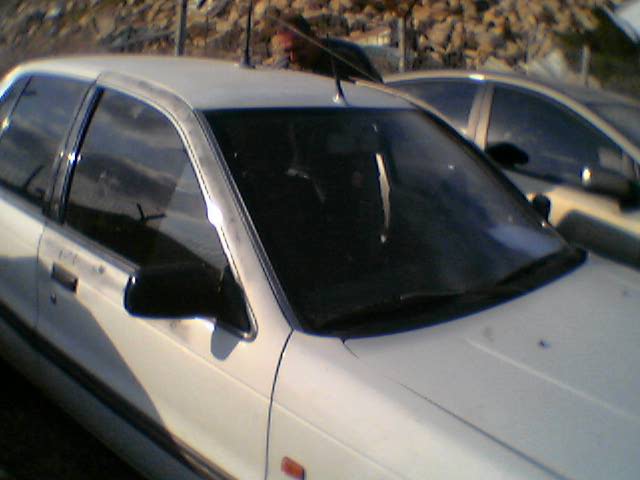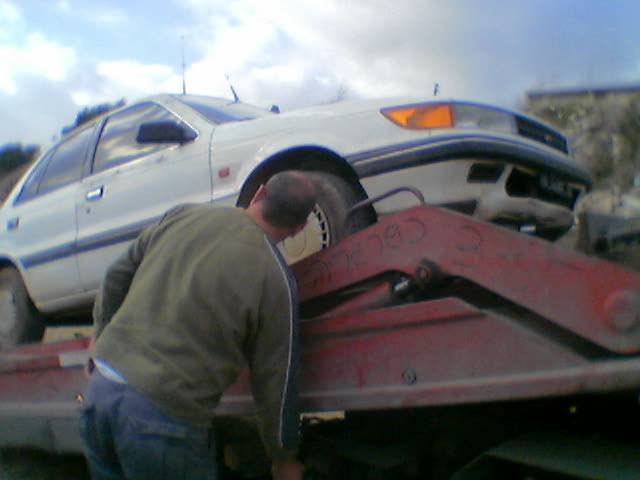After all, to my big surprise, I won a prize in the August Penguin 4 prize drawing near the end of the event. I already own a copy of the book which I won, so I was given another (and much thinner) book instead.
This event marked the real end of my first year as the Accessibility Coordinator of Hamakor.
The story starts with the AP3 (August Penguin 3) prize drawing a year ago. I had a prize drawing ticket number. There was a drawing. Someone won. All announcements were made using vibrating air molecules. No one was charged with the task of writing down the winning numbers. So I had no way to know whether my number won. After AP3 I wrote about this, and the response was that I was right – there was an accessibility problem in AP3.
ladypine asked me if I am willing to volunteer to work on improving accessibility. I accepted the job and took over the title “Accessibility Coordinator”. During the year which elapsed since then, I gave two lectures about accessibility in Linux (in Haifux and in Telux lecture No. 28). I owe thanks to Ori Idan, for his help in filling in the blindness relevant information.
As preparations for AP4 (August Penguin 4) started, I became more involved. The first order of business was to ensure that the chosen location is accessible to people with mobility impairment. The Israel Accessibility Web site was helpful with this. I appreciate the cooperation, which I got from Limor Ben-Yossef. She let me know which locations are being considered, so that I could check for information about their accessibility.
After a location was selected, it was time to consider accessibility for blind and hearing impaired people. Blind people need a copy of presentations in their own Braille-enabled PCs. However, no one requested assistance with this.
Hearing impaired people need one of few accessibility provisions: Wireless microphone for HOH (hard-of-hearing), typist (notetaker) with laptop and projector and/or Sign Language interpreter for the deaf. I publicized a call for interested people in a forum of HOH and deaf people asking anyone, who wants to come to AP4, to let me know about this. I got zero responses. So I needed to arrange for accessibility only for myself.
Here again I got cooperation. I took upon myself to book a notetaker. I indicated that neither projector nor Sign Language interpreter are needed. AP4 organizers agreed to let the notetaker enter without payment. I asked to reserve a cluster of 5 chairs for the notetaker and four hearing-impaired people. Again, no problems.
Few days before the event, I publicized a call for interested hearing impaired people, with intention of asking for a projector and screen at the last moment, should there be more demand. I received one response.
In AP4 itself, the decision to bring extension electrical cord paid off. I got electrical power for the laptop from a socket several meters away from where we sat. One of the workers secured the cord to the floor using maskingtape. Initially, there was a problem with a desk. However it was solved by our using the Geeks’ desk until they needed it during the AP Trivia Contest.
Until lunch break, the notetaker served two hearing-impaired people – me and another person, whose name is not disclosed here due to privacy considrations. At lunch he left the event and until the end I was the sole beneficiary of this accessibility provision. It proved to be adequate for the event, as evidenced by the fact that I could contribute an audience answer to one of the Trivia Contest questions (another way to determine the bandwidth of snails vs. Bezeq ADSL links).
I noticed that the organizers were thoughtful to put a big screen with status information in the Exhibitors’ and APCHI contest hall. The big screen alternated between the APCHI contest participants’ status and the most up-to-date schedule of the AP4 lectures. The screen was useful as another accessibility measure for the hearing impaired, as in AP3 I had another rant about not knowing when will the current lecture end. I assume that the screen was helpful also to all participants and to the event organizers, who needed not be bothered by participants wandering on the halls and asking for starting time and subject of the next lecture.
When the prize drawing began, ladypine made a point of ensuring that the notetaker does type down the numbers of winning cards. When my card’s number came up, I at first stared with unbelief. It is so Douglas Addamsish to win a drawing the very first time after a drawing, which was inaccessible to me.
What is 15797? It was my winning number.
Like this:
Like Loading...


